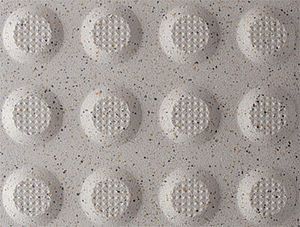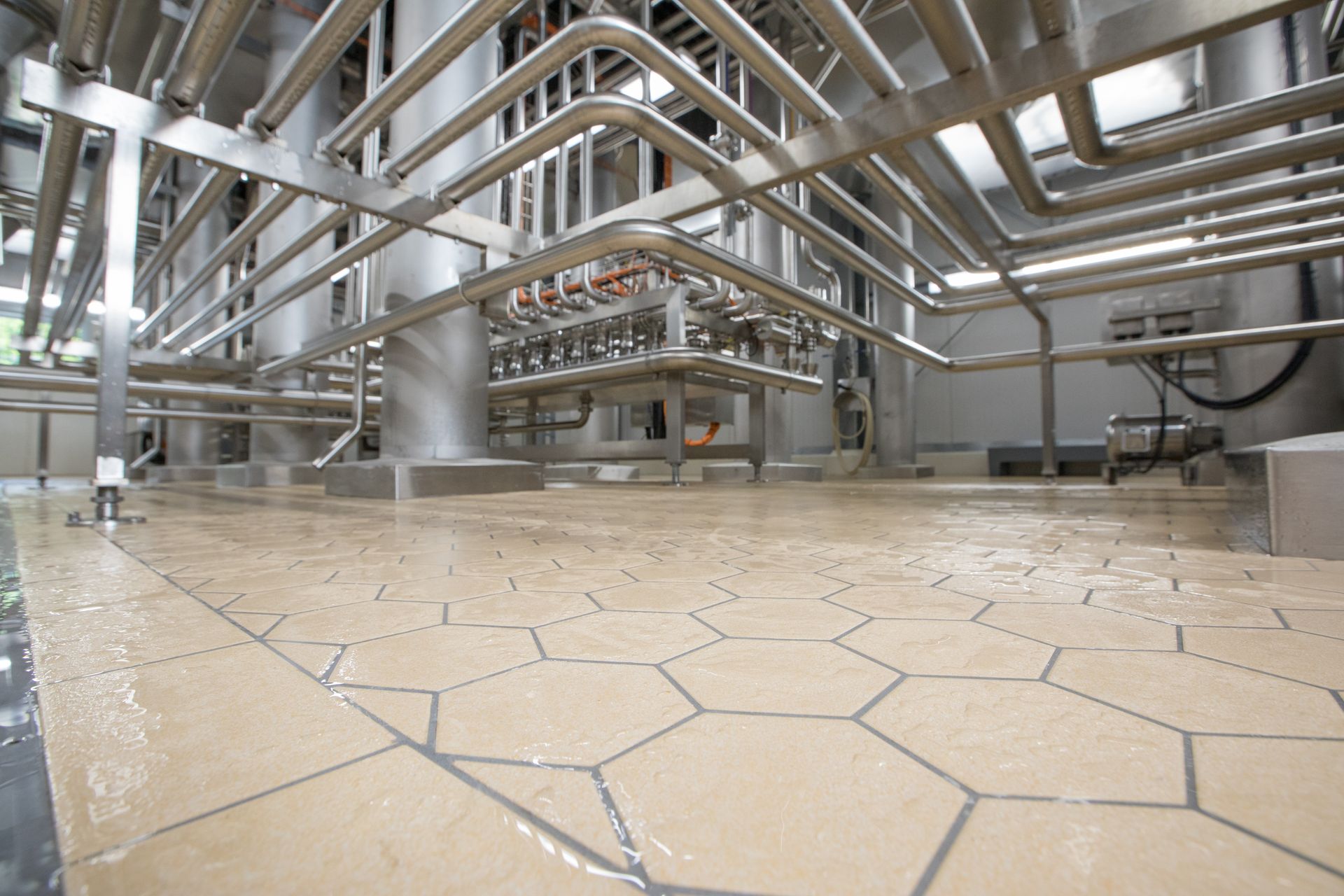Tile Flooring vs Polished Concrete: Costs, Benefits, & More
When selecting industrial or commercial flooring, decision-makers often weigh tile flooring against polished concrete. Each surface offers unique characteristics in terms of durability, cost-efficiency, safety, and aesthetics. Understanding the differences is key to choosing the right flooring solution for your facility.
An Overview of Tile Flooring
Engineered ceramic tile flooring, such as the fully vitrified solutions from Argelith, delivers unmatched strength, hygiene, and longevity in industrial environments. These tiles are manufactured under extreme pressure and high temperatures, resulting in a dense, non-porous material that resists water infiltration, stains, and chemical damage.
Argelith tiles also incorporate slip-resistant surfaces and can include safety striping, making them ideal for automotive service areas, food production lines, and commercial kitchens. With color options such as Mars Red, Titan Gray, and Light Gray, the tiles offer functional aesthetics that hold up under extreme wear.
Costs
The costs of concrete vs tile vary significantly based on installation complexity, material quality, and long-term maintenance needs. While concrete may offer lower upfront costs, tile flooring often proves more economical over the lifecycle of the floor.
Tile
Engineered ceramic tile flooring involves a higher initial investment but delivers long-term savings due to superior durability and minimal maintenance. Argelith’s fully vitrified tiles are designed to withstand aggressive environments without degradation.
- Grouting: Epoxy grout is recommended in industrial settings for its chemical and moisture resistance, though it comes at a higher cost than cementitious grout.
- Maintenance: Requires only standard cleaning with auto-scrubbers. Tiles resist cracking, staining, and chemical damage, significantly reducing repair costs.
- Longevity: Tiles can last several decades with proper installation and care, even in heavy-use environments.
Polished Concrete
Polished concrete offers a lower upfront price but requires more frequent maintenance and may degrade faster in industrial settings.
- Installation cost: $3 to $10 per square foot depending on slab preparation, grinding stages, and polish level.
- Sealing and densification: Often needed to improve surface strength and stain resistance, adding to the cost.
- Maintenance: Requires routine cleaning and periodic resealing. Cracks and wear from thermal cycling or heavy impacts may demand repair.
Benefits
Tile
Engineered ceramic tile flooring offers a host of performance advantages, especially in demanding industrial and commercial environments:
- Extreme Durability: Resists impact from forklifts, dropped tools, and machinery without cracking or surface wear.
- Slip Resistance: Textured surfaces and optional safety striping improve traction and worker safety, even in wet or oily conditions.
- Hygiene: The fully vitrified, non-porous structure prevents liquid and bacteria penetration—ideal for food production and clean environments.
- Chemical Resistance: Withstands exposure to acids, alkalis, oils, and cleaning agents commonly used in industrial settings.
- Thermal Shock Tolerance: Performs under wide temperature variations, including steam cleaning and hot washdowns.
- Aesthetic Longevity: Color-through body and baked-on finishes maintain appearance even under aggressive use and cleaning.
Polished Concrete
Polished concrete has benefits in certain commercial applications, especially where cost-efficiency and aesthetics are top priorities:
- Lower Initial Cost: Often less expensive to install, making it suitable for large, low-impact areas like warehouses.
- Minimal Materials: Utilizes the existing concrete slab, reducing material usage and installation time.
- Customizable Appearance: Can be dyed or embedded with aggregates to create a visually distinct surface.
- Reflective Finish: Enhances ambient lighting in large spaces, potentially reducing lighting costs.
Common Applications
Tile
Argelith’s engineered tile flooring excels in environments that demand strength, hygiene, and resistance to chemicals or thermal extremes:
- Food and Beverage Processing Plants: Impervious surfaces meet hygiene and sanitation standards.
- Automotive Workshops: Withstands oil spills, dropped tools, and heavy rolling loads.
- Breweries and Distilleries: Non-slip texture and resistance to acids make it ideal for wet production areas.
- Commercial Kitchens: Easy to clean, slip-resistant, and tolerant of thermal shock from hot washdowns.
- Grocery Stores: Durable enough for high foot traffic and frequent cleaning in backrooms and prep areas.
- Laboratories and Pharma: Chemical resistance and hygiene make tile suitable for controlled environments.
Polished Concrete
Polished concrete performs well in light-to-moderate duty applications where aesthetics and budget-conscious decisions are driving factors:
- Retail Stores: Offers a clean, modern appearance at a lower cost.
- Warehouses: Suitable for dry storage areas with minimal heavy impact or chemical exposure.
- Office Spaces and Lobbies: Reflective finishes enhance natural light and create a professional look.
- Showrooms: Can be dyed or customized to fit branding and display needs.
- Event Venues: Economical choice for large, open interiors with low maintenance needs.
Challenges
Tile
While engineered tile flooring offers high performance, there are considerations to ensure long-term success:
- Higher Upfront Investment: Initial material and installation costs are higher than concrete, particularly when using epoxy grout and advanced installation methods like vibration setting.
- Installation Complexity: Requires experienced installers familiar with substrate preparation, proper tile setting, and grouting techniques to prevent performance issues.
- Substrate Sensitivity: Subfloors must be properly leveled and prepared to avoid tile movement or cracking over time.
- Grout Selection: Using the wrong grout (e.g., cementitious in chemical-heavy areas) can lead to premature failure. Epoxy grout is strongly recommended for industrial environments.
Polished Concrete
Though economical, polished concrete presents several limitations in more aggressive or demanding environments:
- Moisture Vulnerability: Porous by nature, it can absorb liquids if not sealed properly, leading to staining, bacterial growth, or subfloor issues.
- Cracking: Susceptible to thermal expansion, contraction, and heavy impact damage. Cracks are common over time and may require patching or resurfacing.
- Surface Wear: Can dull or degrade under constant abrasion from traffic, especially in forklift-heavy areas.
- Maintenance Requirements: Needs periodic resealing and polishing to maintain its appearance and performance, especially in high-traffic zones.
Which Flooring Option is Right for You?
Choosing between concrete vs tile flooring involves balancing your facility’s performance needs with budget and long-term goals.
- Select polished concrete if your space is dry, sees light foot traffic, and aesthetics outweigh performance.
- Choose engineered tile flooring when hygiene, impact resistance, and durability are paramount. Facilities that face chemical exposure, thermal extremes, or require daily sanitation will benefit significantly from Argelith’s high-performance solutions.
Get Started with Argelith Today!
Argelith Ceramic Tiles delivers precision-engineered flooring solutions designed for demanding industrial and commercial settings. With a legacy of German engineering, our tiles offer durability, safety, and efficiency that stand the test of time.
Request a consultation to determine the best solution for your facility, or explore our engineered tile offerings



